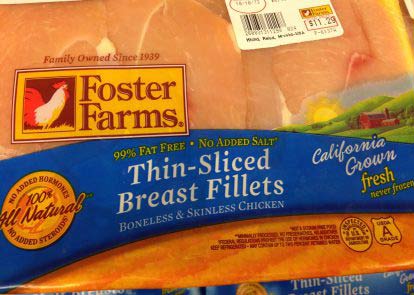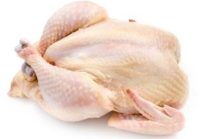USDA Threatens to Shut Down Three Foster Farms Chicken Plants

Editor's Note: The article below was published yesterday, Oct. 9. Today, Ron Foster, president of Foster Farms, issued a public apology, the text of which appears below the Los Angeles Times article.
Source: Los Angeles Times
The U.S. Department of Agriculture is threatening to close three California poultry plants operated by Foster Farms blamed for an outbreak of salmonella poisoning that has sickened at least 278 people nationwide.
In a letter sent Monday to Foster Farms, the USDA said sanitary conditions at the facilities were so poor that they posed a "serious ongoing threat to public health."
The agency has ordered Foster Farms, one of the nation's largest privately owned poultry producers, to develop a plan by Thursday to clean up the plants. Two of those facilities are in Fresno and one is in Livingston, CA, where the company is based.
Foster Farms did not reply to repeated attempts for comment.
The USDA first issued a health alert Monday warning consumers to avoid raw chicken from the three facilities after they detected strains of Salmonella Heidelberg, a strain that has been linked to human illness.
Fears were heightened Tuesday when the Centers for Disease Control and Prevention said 42% of sickened individuals were hospitalized — double the normal rate for such an outbreak. The CDC also reported that some of the salmonella strains detected were showing resistance to antibiotics.
"That helps explain the high rates of hospitalization," said Caroline Smith DeWaal, food safety director for the Center for Science in the Public Interest, which is calling for a recall of poultry from the problem facilities.
Consumer Reports magazine said Wednesday that it found a strain of Salmonella Heidelberg while testing a batch of Foster Farms chicken and demanded a recall.
"It is outrageous that Foster Farms has not issued a recall in the face of so many illnesses associated with their product," said Urvashi Rangan, toxicologist and executive director of the Consumer Reports' Food Safety and Sustainability Center. "We are calling on Foster Farms and the retail outlets that sell Foster Farms to recall the chicken processed at these plants. Foster Farms has a responsibility to public health to take this step."
Authorities have not issued a recall, but the nation's largest grocery chain, Kroger Co., said Tuesday that it was pulling chicken from the three Foster Farms plants off shelves. Kroger operates Ralphs and Food 4 Less.
"Those include fresh products, which would be like whole fryers, breasts, drums, thighs and ground chicken," said Kendra Doyel, a spokeswoman for Ralphs. "It would not include cooked or processed products like lunch meat [and] hot dogs."
The chicken in question can be identified in supermarkets with USDA marks of inspection P6137, P6137A or P7632.
Salmonella does not trigger an automatic recall like some forms of E. coli because it's not deemed an adulterant. Instead, the USDA considers salmonella a naturally occurring bacteria that can be mitigated with proper cooking and handling.
Bill Marler, a Seattle-based food safety attorney, said that position needs to change because antibiotic use in agriculture has been creating dangerous forms of salmonella that are resistant to traditional drugs.
"The USDA has been incredibly gun-shy with salmonella and basically has been punting this problem down the road," Marler said. "While at the same time you're seeing more virulent and more antibiotic-resistant salmonella. The reality on the ground is not keeping up with science. The fact is, this stuff is more problematic than it was just 10 years ago. It's a different ballgame."
For years the poultry industry has used antibiotics to promote faster growth in animals. But the trend has alarmed food safety advocates, who worry that overuse is leading to human resistance to certain types of these drugs. Just last month, a report by the CDC identified agriculture as an area of concern.
Consumers increasingly are demanding antibiotic-free meat. The Food and Drug Administration plans to phase out the use of several antibiotics on farms intended to promote growth in animals.
John Glisson, director of research for the U.S. Poultry & Egg Assn., defends the use of antibiotics in agriculture. He said most farmers don't abuse antibiotics because the drugs are expensive.
Still, Glisson stressed that salmonella was a formidable challenge to the poultry industry.
The bacteria grows in animals' intestinal tracts and is spread through feces. It can contaminate a chicken farm through water, feed, birds and rodents. When infected chicken waste dries, salmonella can spread through dust.
"It can be on anything," Glisson said. "It's a real challenge. If the poultry industry knew how to completely eliminate salmonella, it would do it."
Source: KMJ News Radio
[KMJ Editor's Note: Below is a statement from Foster Farms President Ron Foster, commenting on the recent Salmonella outbreak linked to hundreds of illnesses. The chicken in question was processed at two plants in Fresno, CA, and one in Livingston, CA.]
On behalf of my family, I am sorry for any foodborne illness associated with Foster Farms chicken and for any concern this may have caused you. All of us at Foster Farms are continuing to work around the clock to fully address this situation and to ensure you have a safe and wholesome experience with our products.
The alert that regulators issued based on illnesses over the past seven months emphasizes the need to fully cook and properly handle raw poultry. Our facilities have always met and exceeded USDA standards. USDA continues to inspect and approve our chicken products as safe to consume.
As a further sign of our dedication, as soon as we were alerted to any concern, we brought in national food safety experts to assess our processes and have reinforced our processes with new technologies proven to be effective.
We have worked hard to earn your trust for more than 80 years, and I pledge to resolve these issues so you can continue to enjoy the very best chicken from my family to yours.
Looking for a reprint of this article?
From high-res PDFs to custom plaques, order your copy today!




